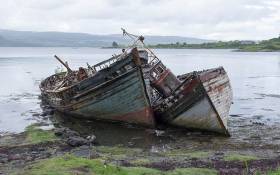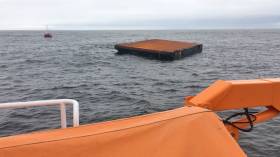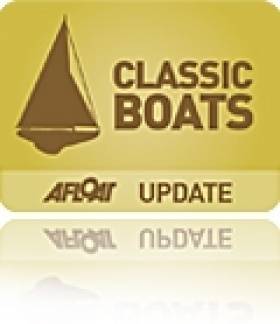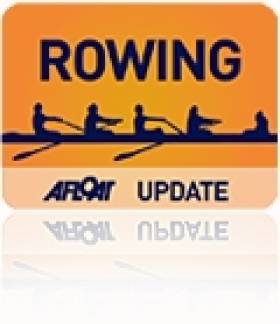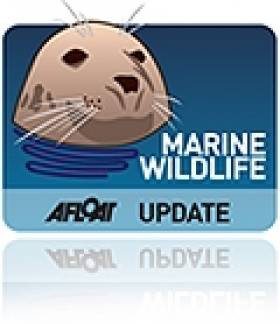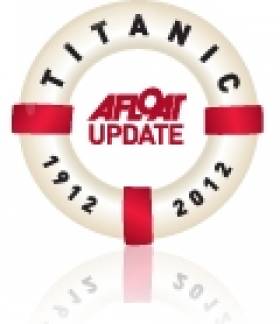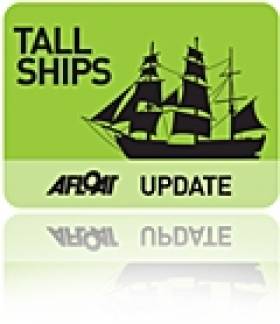Displaying items by tag: Canada
Canadian boat owners could be liable to fines of up to €4 million under new legislation to tackle the scourge of abandoned vessels on the country’s coastlines, particularly in the western province of British Columbia.
International Boat Industry reports that the Wrecked, Abandoned or Hazardous Vessels Act sets a prohibition on abandoning vessels while increasing owner responsibility for problem boats — and giving the Canadian government new powers to remove them.
Authorities in Ireland have similar powers under the Canal Act 1986 (Bye-Laws) 1988 to remove from inland waterways any non-permitted vessels, non-attended and apparently abandoned vessels, boats that are double-moored or causing an obstruction, or vessels deemed to be/likely to cause a hazard to navigation.
The new Canadian law can levy “penalties of up to $50,000 (CAD) for individuals and $250,000 for companies or corporations, while regulatory offence prosecution could result in a maximum fine of $1m for individuals and $6m for companies or corporations.”
It comes as part of a National Strategy to Address Canada’s Wrecked and Abandoned Vessels, which has included funding programmes to support coastal communities in the removal of smaller derelict vessels blighting their localities.
International Boat Industry has more on the story HERE.
#RNLI - Ballyglass RNLI’s lifeboat crew had an unusual callout on Monday evening (14 May) when they were launched to recover a runaway barge that had drifted to the Mayo coast across the Atlantic from Canada more than 3,000km away.
The large floating barge had broken from its moorings in Labrador in north-east Canada last November, and after six months at sea was spotted and reported by a passing fishing vessel earlier on Monday.
Ballyglass RNLI received the call to launch last night at 7.20pm. On arriving on scene, the lifeboat crew found a steel barge measuring 26 metres by 16 metres, which was unsecured and floating.
The lifeboat crew established a tow and brought the barge back to Ballyglass Harbour.
However, with no room to berth such a large barge safely, it was put on the lifeboat mooring before a more permanent solution could be found. The crew were not stood down until 2am this morning.
All in all, it took the lifeboat crew seven hours to secure the barge and and bring it safely to Ballyglass.
Commenting on the shout, Ballyglass RNLI lifeboat operations manager Padraic Sheeran said: “We were not expecting this type of callout at all. You do hear of vessels and craft breaking free of moorings but it’s unusual to have one drift thousands of kilometres and have to be rescued by lifeboat.
“On a serious note though, it represented a major navigational danger to any vessel that it collided with and it was a relief to have it safely recovered.”
The callout will remind Afloat.ie readers of the houseboat that drifted from Newfoundland to the Mayo coast in November 2016.
NI Nurse Comforts Survivors Of Canada Whale Boat Tragedy
#WhaleBoat - A nurse from Northern Ireland was among those who assisted survivors of the tragic whale boat capsize in Canada at the weekend, as BBC News reports.
Five people – all British – died and a sixth, an Australian national, is still missing after the whale-watching boat Leviathan II sank off Vancouver Island on Sunday.
Twenty-one others on the boat were rescued from the water thanks to the quick action of the local Ahousaht First Nation community, who were first to respond, along with fishing boats and other vessels in the area.
Also at a nearby dock to give comfort to the survivors as they came ashore was Sheila Simpson, originally from Strabane, Co Tyrone, who told the BBC's Good Morning Ulster: "I looked them in the eye and I put my hand to their back and I said 'you are alive, you have survived'."
The stability of the Leviathan II at the time of the incident in question as it's believed the passengers – none of whom were wearing lifejackets – were standing on the vessel's port side when an unexpected wave hit from starboard in what were reportedly calm conditions.
BBC News has more on the story HERE.
Canadian Shipwreck Discovery Solves 170-Year-Old Mystery
#Shipwreck - "One of Canada's greatest mysteries has been solved," said that country's Prime Minister Stephen Harper earlier this month upon news that the wreck of one of two ships famously lost in a mid-19th-century Arctic expedition has likely been located.
National Geographic has details of the rediscovery of the remains of either the HMS Erebus and HMS Terror, both of which disappeared in 1846 during an ill-fated expedition led by Sir John Franklin to map the Northwest Passage.
Sonar images captured by an ROV off King William Island in the northern Canadian province of Nunavut show the mostly intact hull of a ship – and according to maritime historian James Delgado, "there is no doubt" that it represents that final resting place of one of the lost vessels.
What's more, the ship's largely preserved condition means it could prove an invaluable "time capsule" to learn more about the people who embarked on that voyage some 170 years ago.
National Geographic has much more on the story HERE.
#Adventure - An Irish duo have returned home after crossing the world's largest frozen lake in Russia.
As RTÉ News reports, Mike O'Shea from Dingle and Clare O'Leary from Bandon traversed the 640km-long Lake Baikal in Siberia over 26 days, contending with temperatures 30 degrees below freezing.
The challenge was the second mission in the veteran adventurer pair's 'Ice Project', an attempt to cross the world's main ice caps before the end of 2016.
Their next adventure will be a crossing of either Iceland or Greenland - where another intrepid group of Irish adventurers are headed this summer, as previously reported on Afloat.ie.
Meanwhile, rower Paul Gleeson writes in The Irish Times about his own upcoming challenge, joining three other men in a 25ft rowing boat to travel the 2,000 miles of the Northwest Passage in the Canadian Arctic.
Limerick man Gleeson, who is now based in Canada, compares the trek to the infamous Franklin Expedition through the passage in the mid 1800s - a tragic mission with an Irish connection through its second-in-command Francis Crozier.
The Irish Times has much more on the story HERE.
Message in a Bottle Lands in Waterford After Eight Years At Sea
#MESSAGE IN A BOTTLE - It took eight years to cross the Atlantic, but a message in a bottle sent by two girls from eastern Canada finally found a recipient - in Co Waterford.
As the Irish Independent reports, 10-year-old Oisin Millea found the letter encased in a 2-litre soft drink bottle more than a week ago among litter from the sea strewn across the beach at Passage East.
And thanks to the wonders of the internet, he was able to contact the girls who sent the message - and even see them on his computer screen via Skype.
RTÉ News says it got in touch with the two French-Canadians, who were aged 12 when they sent the bottle into the sea via the St Lawrence River in Quebec back in the summer of 2004.
Charlene Dalpé and Claudia Garneau, now 20 years old, told the Irish Independent that they have remained friends since, and described Oisin's discovery as "really exciting".
McElroy Takes Over as Performance Director for Men's Rowing in Canada
# ROWING: Martin McElroy, who was the Ireland high performance director from 2009 to 2012, has been chosen as performance director for men’s rowing in Canada. The Galway native, who is 49, came to prominence when he guided the Britain men’s eight to gold in Sydney in 2000. He and his team had some success at under-23 level in Ireland, with the highlight being a silver medal for the lightweight men’s quadruple scull at the 2010 World Under-23 Championships. However, at Olympic level, just one Irish athlete competed at London 2012. Sanita Puspure finished 13th in the women’s single scull.
Outgoing coach Mike Spracklen, who led the Canadian men's eight to wins at the 1992 and 2008 Olympic Games as well as a silver medal at the London 2012 Games, has not had his contract renewed. A controversy has erupted at the decision, with Spracklen speaking of a vendetta by oarsman Scott Frandsen, who has criticised his methods.
Canada Watching EU Seal Cull Plans With Interest
#MARINE WILDLIFE - The Globe and Mail reports that Canada is keeping tabs on an EU plan to "manage" Europe's seal population amid growing controversy over the issue.
Last month the European Parliament approved a resolution on the Common Fisheries Policy that called for the European Commission to investigate the impact of "natural predators such as sea lions, seals and cormorants" on the reduction of fish stocks and draw up plans to regulate their numbers.
Canada's sealing industry claims this about-face in EU policy is hypocritical considering Europe's ban on commercial seal products three years ago, as well as its longstanding criticism of the Canadian seal hunt.
Already Scotland has approved a cull that has granted licences to kill over 1,000 seals on its coastline this year alone. And fishermen in Ireland, particularly on the west coast, are calling for the Irish authorities to take similar action.
Afloat.ie has previously reported on the tensions between fishermen and marine wildlife campaigners over the impact of protected seal populations on fish stocks.
Over the summer, the Dingle Seal Sanctuary claimed that a number of horrific reports of illegal seal killings committed by culprits unknown are part of a "swing in activity" since the start of the year - although the National Parks and Wildlife Service said it has not recorded any increase.
Fishermen in Kerry have come out in condemnation of these illegal killings, in particular the barbaric scene in which two baby seal heads were nailed to signs outside the Dingle sanctuary in early June.
However, they maintain that a cull of the local grey seal population is necessary, claiming they are "over-protected" and can consume as much as 10kg of fish each per day, resulting in depleted stocks of hake and haddock, as well as posing a threat to salmon conservation measures.
The Globe and Mail has more on the story HERE.
The 13 Deadliest Shipwrecks in History
#TITANIC - Irreverent tech website Gizmodo has marked the 100th annversary of the sinking of the Titanic with a list of the 13 deadliest shipwrecks in history.
The list runs the gamut from well over a century ago, in the early days of passenger shipping - see the SS Sultana, a tragedy overshadowed by the assassination of Abraham Lincoln and the end of the American Civl War - to more recent events.
Included are such as sad tales as that of the Empress of Ireland, the worst disaster in Canadian maritime history in which more than 1,000 died, and much closer to home the Lusitania, which went down off Kinsale in May 1915 after a torpedo attack.
But the worst was arguably suffered by the passengers of the steamship SS Kiangya - which blew up 50 miles north of Shanghai in December 1948, taking as many as 3,920 lives - and the horror that befell the MV Doña Paz in the Philippines in December 1987, where estimates put the death toll at an unbelievable 4,000.
Gizmodo has more on the story HERE.
Safety of World's Tall Ships In Question
Safety on the world's 700 sail training tall ships has been called into doubt, Sail World reports.
The concern comes following an investigation into the sinking of Canadian tall ship Concordia off the coast of Brazil last year.
The ship capsized in a squall on 17 February 2010. All 64 passengers and crew spent two days adrift in lifeboats before being rescued.
Investigators from the Transportation Safety Board of Canada concluded last week that no action was taken to prevent capsizing, such as reducing sail or changing course, because the officer-in-charge did not realise the ship was in danger.
The board also learned that the officer-in-charge was able to get his certification without having to familiarise himself with information on the handling and stability of the ship, and found that this lack of a requirement is universal across the world's sail training vessels.
Senior investigator Paulo Ekkebus said this was "a large concern" and called for stricter standards worldwide.
He added: "We’ve not been able to find any country, any flag-state, requiring the study, or for people that they are familiar with this type of information, if it is provided on board the ship."
Sail World has much more on the story HERE.


























